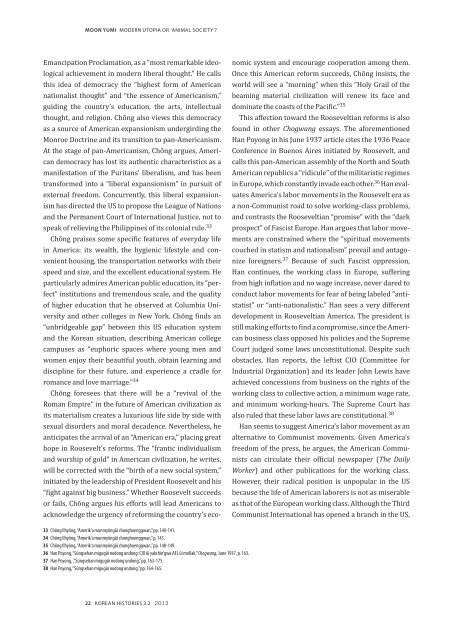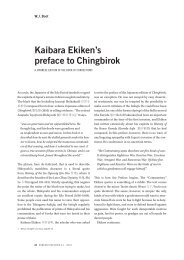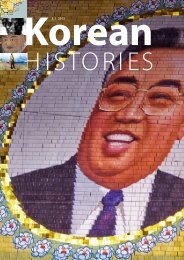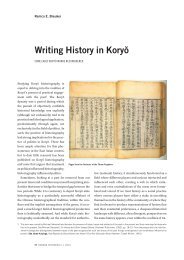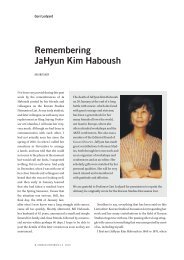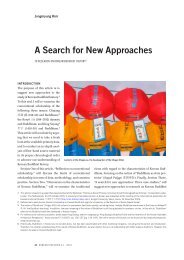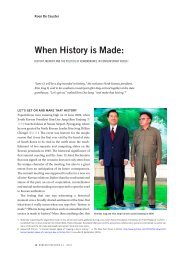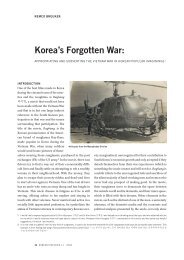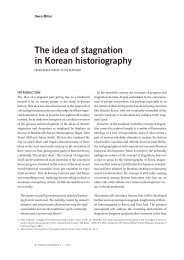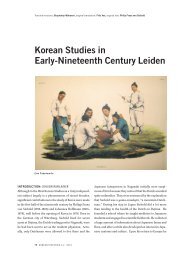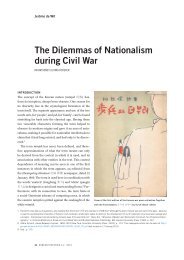Create successful ePaper yourself
Turn your PDF publications into a flip-book with our unique Google optimized e-Paper software.
Moon Yumi Modern Utopia or ‘Animal Society’?<br />
Emancipation Proclamation, as a “most remarkable ideological<br />
achievement in modern liberal thought.” He calls<br />
this idea of democracy the “highest form of American<br />
nationalist thought” and “the essence of Americanism,”<br />
guiding the country’s education, the arts, intellectual<br />
thought, and religion. Chŏng also views this democracy<br />
as a source of American expansionism undergirding the<br />
Monroe Doctrine and its transition to pan-Americanism.<br />
At the stage of pan-Americanism, Chŏng argues, American<br />
democracy has lost its authentic characteristics as a<br />
manifestation of the Puritans’ liberalism, and has been<br />
transformed into a “liberal expansionism” in pursuit of<br />
external freedom. Concurrently, this liberal expansionism<br />
has directed the US to propose the League of Nations<br />
and the Permanent Court of International Justice, not to<br />
speak of relieving the Philippines of its colonial rule. 33<br />
Chŏng praises some specific features of everyday life<br />
in America: its wealth, the hygienic lifestyle and convenient<br />
housing, the transportation networks with their<br />
speed and size, and the excellent educational system. He<br />
particularly admires American public education, its “perfect”<br />
institutions and tremendous scale, and the quality<br />
of higher education that he observed at Columbia University<br />
and other colleges in New York. Chŏng finds an<br />
“unbridgeable gap” between this US education system<br />
and the <strong>Korean</strong> situation, describing American college<br />
campuses as “euphoric spaces w<strong>here</strong> young men and<br />
women enjoy their beautiful youth, obtain learning and<br />
discipline for their future, and experience a cradle for<br />
romance and love marriage.” 34<br />
Chŏng foresees that t<strong>here</strong> will be a “revival of the<br />
Roman Empire” in the future of American civilization as<br />
its materialism creates a luxurious life side by side with<br />
sexual disorders and moral decadence. Nevertheless, he<br />
anticipates the arrival of an “American era,” placing great<br />
hope in Roosevelt’s reforms. The “frantic individualism<br />
and worship of gold” in American civilization, he writes,<br />
will be corrected with the “birth of a new social system,”<br />
initiated by the leadership of President Roosevelt and his<br />
“fight against big business.” Whether Roosevelt succeeds<br />
or fails, Chŏng argues his efforts will lead Americans to<br />
acknowledge the urgency of reforming the country’s economic<br />
system and encourage cooperation among them.<br />
Once this American reform succeeds, Chŏng insists, the<br />
world will see a “morning” when this “Holy Grail of the<br />
beaming material civilization will renew its face and<br />
dominate the coasts of the Pacific.” 35<br />
This affection toward the Rooseveltian reforms is also<br />
found in other Chogwang essays. The aforementioned<br />
Han Poyong in his June 1937 article cites the 1936 Peace<br />
Conference in Buenos Aires initiated by Roosevelt, and<br />
calls this pan-American assembly of the North and South<br />
American republics a “ridicule” of the militaristic regimes<br />
in Europe, which constantly invade each other. 36 Han evaluates<br />
America’s labor movements in the Roosevelt era as<br />
a non-Communist road to solve working-class problems,<br />
and contrasts the Rooseveltian “promise” with the “dark<br />
prospect” of Fascist Europe. Han argues that labor movements<br />
are constrained w<strong>here</strong> the “spiritual movements<br />
couched in statism and nationalism” prevail and antagonize<br />
foreigners. 37 Because of such Fascist oppression,<br />
Han continues, the working class in Europe, suffering<br />
from high inflation and no wage increase, never dared to<br />
conduct labor movements for fear of being labeled “antistatist”<br />
or “anti-nationalistic.” Han sees a very different<br />
development in Rooseveltian America. The president is<br />
still making efforts to find a compromise, since the American<br />
business class opposed his policies and the Supreme<br />
Court judged some laws unconstitutional. Despite such<br />
obstacles, Han reports, the leftist CIO (Committee for<br />
Industrial Organization) and its leader John Lewis have<br />
achieved concessions from business on the rights of the<br />
working class to collective action, a minimum wage rate,<br />
and minimum working-hours. The Supreme Court has<br />
also ruled that these labor laws are constitutional. 38<br />
Han seems to suggest America’s labor movement as an<br />
alternative to Communist movements. Given America’s<br />
freedom of the press, he argues, the American Communists<br />
can circulate their official newspaper (The Daily<br />
Worker) and other publications for the working class.<br />
However, their radical position is unpopular in the US<br />
because the life of American laborers is not as miserable<br />
as that of the European working class. Although the Third<br />
Communist International has opened a branch in the US,<br />
33 Chŏng Ilhyŏng, “Amerik’a munmyŏngŭi chonghoenggwan,” pp. 140-141.<br />
34 Chŏng Ilhyŏng, “Amerik’a munmyŏngŭi chonghoenggwan,” p. 143.<br />
35 Chŏng Ilhyŏng, “Amerik’a munmyŏngŭi chonghoenggwan,” pp. 148-149.<br />
36 Han Poyong, “Sŭngsehan migugŭi nodong undong: CIO ŭi yakchin’gwa AFL ŭi mollak,” Chogwang, June 1937, p. 163.<br />
37 Han Poyong, ,“Sŭngsehan migugŭi nodong undong,” pp. 163-175.<br />
38 Han Poyong, “Sŭngsehan migugŭi nodong undong,” pp. 164-165.<br />
22 <strong>Korean</strong> <strong>Histories</strong> 3.2 2013


